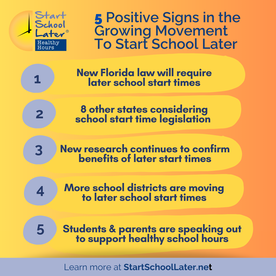|
Growing alarm at the teen mental health crisis along with post-pandemic learning loss is spurring more and more leaders into action  (Severna Park, MD) Decades of research show that when school days start later for middle and high schoolers, students get more sleep, feel better, and perform better – in class, with friends and family, and behind the wheel. Here are five recent developments in the U.S. movement to start school later. Starting School Later Improves Teen Physical and Mental Health, Safety, and School Performance1/18/2022 Starting School Later Improves Teen Physical and Mental Health, Safety, and School PerformanceResearch Summit Provides Roadmap to Ensuring Sleep-Friendly School Hours Across the Nation (Severna Park, MD) Most U.S. schools should — and can — start later in the morning. That’s the conclusion of a virtual research summit held at Stanford University, organized in response to California’s “healthy school start time” law (SB328) scheduled for implementation later this year and co-sponsored by the non-profit Start School Later (SSL) and the California PTA. A new paper summarizing the summit findings is available online and will be published in the February edition of Sleep Health, the National Sleep Foundation’s peer-reviewed journal. The California law requires most public secondary schools in the state to protect adolescent sleep health by starting high schools no earlier than 8:30 a.m. and middle schools no earlier than 8 a.m. In recent years, over a dozen other state legislatures have considered legislation regarding school start times, including several currently considering bills similar to California’s. Recognizing this unique opportunity as California rolls out the new law, Start School Later spearheaded an effort to convene experts from a wide variety of disciplines to identify interdisciplinary research opportunities. By reviewing decades-worth of multidisciplinary research on adolescent sleep health and school start times in areas as diverse as health and education policy, juvenile justice, academic performance, health equity, and physical and mental wellbeing, the resulting summit created a roadmap to building on existing research and turning it into school policy. Click here to watch a recorded discussion of the Summit outcomes with Stanford’s Dr. Raphael Pelayo and other Summit participants. |
 RSS Feed
RSS Feed